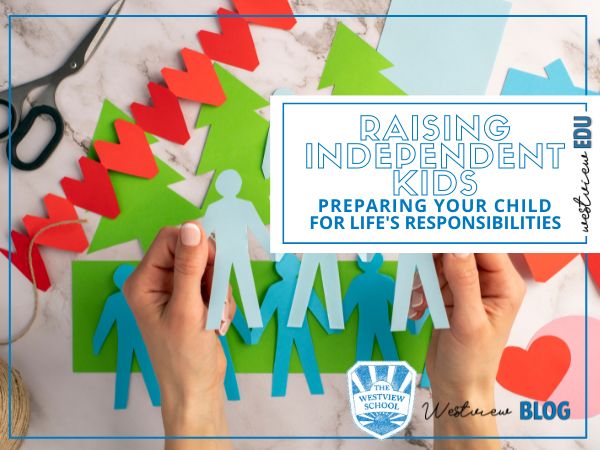
Raising Independent Kids: Preparing for Life's Responsibilities

Throughout most of children's lives, parents wear the badge of caregiver. Not only do we coordinate our children's medical and mental healthcare, but we also pack lunches, pick out clothes, provide meals, and the list goes on. When you've spent so much time caregiving, it can be anxiety-provoking to start thinking about your child becoming independent and your role as a parent changing. However, isn't independence (to the greatest extent possible) the ultimate goal we want for all children?
Fostering independence has several long-term positive benefits for your child. We know it increases self-esteem and confidence, builds essential life skills, teaches the importance of completing a task, creates a sense of being part of a team, and ultimately helps establish a long-term pattern of self-help behaviors. The trick to fostering independence is to begin with the end in mind. What long-term goals do you have for your child? If your child is older, what are their goals? Are your expectations developmentally appropriate? Do your interactions with your child foster independence, codependency, or interdependence?
When we think about building a strong foundation for independence in the future, we think about a few key areas. Keep in mind that the pace at which your child masters these foundational skills will vary based on their individual abilities.
- Having developmentally appropriate expectations – It is important to ensure your child's expectations are not too low or too high. Think about your child's development in relation to their actual age.
- Practicing effective communication – Prioritize clear and calm communication, which is key to ensuring understanding and compliance. Give your child 5-10 seconds to respond to allow processing time. Utilize pictures and other visuals for communication if your child is a visual learner.
- Maximizing learning opportunities – Make daily activities into learning experiences by giving your child choices, narrating daily activities, letting your child help with tasks such as grocery shopping, and letting natural consequences happen when needed.
- Teaching self-care skills – Many of these tasks (ex: tooth brushing) often require several different steps that can be hard for children to understand and remember. Breaking self-care skills into smaller steps helps your child master one step at a time.
- Chores – These types of tasks are vital in building self-efficacy. Avoid chores that your child absolutely hates, as this will help set them and you up for success. Make sure that you teach proper techniques and avoid criticism whenever possible.
Over time, your child and family will master these foundational areas, at which point additional skills, such as planning, focusing attention, remembering instructions, and juggling multiple tasks, become essential to mastering higher-level learning. We call these mental processes "executive functioning," or what we fondly refer to as "the manager of the brain." As academic demands increase (usually around 3rd grade), you may begin to see your child struggle more in this area. You should speak with your child's school for ideas related to accommodations and supports.
As children enter adolescence, it is important for caregivers to starting thinking about independence in the context of their child navigating the world around them. These tips can help your child build independence in the areas of everyday life, school, and their medical care.
- Foster critical thinking – Do not just give your child the answers when they ask you a question. Instead, ask: How do you think we should do that? Where do you think that can be found?
- Teach emergency response – Model and practice handling scenarios at home, such as a fire, a burglary, a medical emergency, etc.
- Talk about the future – Ask your child what they are interested in and prompt conversations about their goals for the future.
Include your child in school meetings (to the extent possible) – Children should know their accommodations and supports and be able to express (verbally or non-verbally) any new needs that may arise. - Prepare them for social settings – Practice common social situations at home such as using lockers, changing in gym, responding to bullying, etc.
- Familiarize them with medical and mental health areas – Children should know what types of doctors they see and why they see them (including the extent of those relationships). They should also know what medications they take and why they are taking them. Do not shy away from topics such as puberty, sexuality, and relationships. It is better for your child to hear these things from you than from a friend.
Developing independent life skills is not a linear process. It is normal for children and teens to take two steps forward, one step back, and then two more steps forward again. Praise progress often, and do not be discouraged! Fostering independence for your child is a marathon, not a sprint.
---
Jennifer Cervantes, LCSW-S, and Dinah Godwin, LCSW-S are Licensed Clinical Social Workers at Meyer Center for Developmental Pediatrics and Autism and Assistant Professors in the Department of Pediatrics at Baylor College of Medicine with extensive experience supporting families of children with developmental disabilities. Jennifer has over a decade of experience in school social work, foster care, and trauma-informed care, while Dinah brings more than 20 years of expertise in clinical care, caregiver support, and program development. Both are passionate about positive behavior management, advocacy, and empowering families through education and community resources.
This blog post was adapted from the presentation given during WestviewEDU on Thursday, March 5, 2025. WestviewEDU is an education series presented by The Westview School for parents and caregivers of children with autism spectrum disorder. For a complete list of WestviewEDU sessions remaining for the 2024-2025 academic calendar year, visit The Westview School online.
